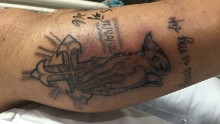

The 30-year-old woman had come in with small lumps under her arms, which had been there for two weeks. A body scan showed even more enlarged lymph nodes in her chest, including near the roots of her lungs.
"Ninety-nine times out of 100, (this) will be lymphoma," said Dr. Christian Bryant, a hematologist at the Royal Prince Alfred Hospital in Sydney. Bryant is one of the woman's doctors.
In the case of the Australian woman, whose name was not released, her lymph nodes were inflamed because of a reaction to the old tattoo ink, not due to cancer cells. Doctors removed a lymph node from her armpit and found a cluster of immune cells that were loaded with black pigment. The woman had a 15-year-old tattoo covering her back, and there was a smaller, more recent one on her shoulder.
"The skin has its own immune cells that are always surveilling the skin," said Dr. Bill Stebbins, director of cosmetic dermatology at Vanderbilt University Medical Center, who was not involved in the report.
Once these immune cells found the tattoo pigment, a foreign substance, they ingested it and traveled from the skin to the lymph nodes over a period of years.
"The pigment is too large for these cells to eat and digest," Stebbins said. "That's why they're still there many years later."
But why the woman had a reaction 15 years after her tattoo is a mystery. Something set off the immune cells, but her doctors couldn't pin down what that trigger might be, Bryant said. The patient noted that her tattoos would occasionally itch, but only for a few days each month. The type of inflammatory response found in her lymph nodes, called a granuloma, was not found in her skin.
"I think there's absolutely no way to know how common it is," Bryant said. "Most people who have tattoos have absolutely no problems."
"We do a lot of tattoo removal with lasers in our practice, and sometimes we see people developing allergic reactions to the ink," said Dr. Bruce Katz, a fellow with the American Academy of Dermatology and director of the Juva Skin and Laser Center in Manhattan. Katz was not involved with the new report.
But these reactions are usually to red pigments, not black.
For those looking to get inked, Katz said, it's crucial to do your research: Make sure the artist is reputable, get references from clients, and ensure that they are using disposable needles and unopened ink to prevent infections.
Stebbins said it's important for people to be aware of these rare complications, because people might not realize that a tattoo can cause inflammation years later. "It's important for physicians to be aware of a tattoo history," he said.
Tattoos are often hidden from view, meaning a doctor may not notice them right away. Almost three-quarters of Americans with tattoos usually hide them under clothing, according to the Pew report.
But the Australian woman's case is far less serious. The last time Bryant saw her, the swollen lymph nodes had subsided.
"It's not going to cause this lady any major problems," Bryant said, "which means we're allowed to be interested without feeling sad."
The hematologist added, "My job's often not like that."






 Add Category
Add Category
